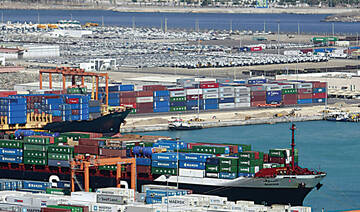DUBAI: Oil prices dropped on Thursday as OPEC+ decided to stick to plans to increase production by 400,000 barrels per day in January.
The drop came after Brent crude futures rose $1.24, or 1.8 percent, to $70.11 by 0748 GMT, having eased 0.5 percent in the previous session.
US West Texas Intermediate (WTI) crude futures gained $1.13, or 1.7 percent, to $66.70 a barrel, after a 0.9 percent drop on Wednesday.
December 02
Global oil prices have lost more than $10 a barrel since last Thursday, when news of omicron first shook investors.
The Organization of the Petroleum Exporting Countries and its allies, together known as OPEC+, will likely decide on Thursday whether to release more oil into the market as previously planned or restrain supply.
Since August, the group has been adding an additional 400,000 barrels per day (bpd) of output to global supply each month, as it gradually winds down record cuts agreed in 2020.
The new variant, though, has complicated the decision-making process, with some observers speculating OPEC+ could pause those additions in January in an attempt to slow supply growth.
December 01
The OECD warned Wednesday that the omicron coronavirus variant threatens the global economic recovery as it lowered the growth outlook for 2021 and appealed for a swifter rollout of COVID-19 vaccines.
The global economy is now expected to expand by 5.6 percent this year, down from an earlier forecast of 5.7 percent, the OECD said in its updated economic outlook
Nigeria’s public health authorities said Wednesday that the new COVID-19 variant, omicron, was identified in samples from three passengers travelling to the continent’s most populous country from South Africa.
“Genomic surveillance has now identified and confirmed Nigeria’s first cases of the B.1.1.529 SARS-CoV-2 lineage, now known as the omicron variant,” the head of Nigeria’s Centre for Disease Control, Ifedayo Adetifa, said in a statement.
Earlier, the UK’s health secretary, Sajid Javid, said it was likely the vaccines would remain effective against serious disease from the new variant. He added it could be two more weeks before more was known about the variant.
Japan has asked airlines to stop taking new incoming flight bookings over concerns about the virus variant.
“We have asked airlines to halt accepting all new incoming flight reservations for one month starting December 1,” a transport ministry official told AFP, adding that existing bookings would not be affected.
Oil prices rose more than 3 percent on Wednesday, recouping a big chunk of the previous session’s steep losses, as major producers prepared to discuss how to respond to the threat of a hit to fuel demand from the omicron variant of the coronavirus.
Brent crude futures rose $2.46, or 3.6 percent, to $71.69 a barrel at 0742 GMT, after rising to as high as $71.95 earlier in the day.
The benchmark had slumped 3.9 percent on Tuesday.
US West Texas Intermediate (WTI) crude futures rose $2.13, or 3.2 percent, to $68.31 a barrel, after a 5.4 percent drop on Tuesday.
The Organization of the Petroleum Exporting Countries (OPEC) will meet on Wednesday after 1300 GMT and ahead of a meeting on Thursday of OPEC+, which groups OPEC with allies including Russia.
November 30
Amid speculations on the impact of omicron on oil demand, the Saudi energy minister said it was too early to tell, adding OPEC+ was keen to monitor the situation.
The group of oil-producing countries has rescheduled its meetings to later this week to have more time in assessing the impact, Prince Abdulaziz bin Salman, told Arab News in an Aramco ceremony in Dhahran on Monday.
Earlier, Russian Deputy Prime Minister Alexander Novak said, there is “no need for emergency measures in the oil market.”
He added OPEC+ partners did not call to review the current deal.
Oil prices rebounded on Monday after a huge slump last week, which was led by fears brought by the new coronavirus variant.
Brent crude futures climbed $3.11, or 4.3 percent, to $75.83 a barrel by 0355 GMT, after falling $9.50 on Friday.
U.S. West Texas Intermediate (WTI) crude was up $3.47, or 5.1 percent, at $71.62 a barrel, having tumbled $10.24 in the previous session.
Oil prices plunged more than 10 percent on Friday, their biggest one-day drop since April 2020, as the new variant spooked investors across financial markets.
There are worries the new variant could derail the global economic recovery, potentially hurting oil demand, while it has also added to concerns that a supply surplus could swell in the first quarter.
Economists at Goldman Sachs outlined four scenarios that could happen as the world cautiously navigates the situation.
If omicron turns out to transmit faster than its predecessor, Delta, it will result in first-quarter global growth slowing to a 2 percent quarter-on-quarter annual rate.
The economists said if both the disease severity and immunity against hospitalizations are worse than for Delta, global economic growth will take a more substantial hit, but inflation impact will be “ambitious.”
On a slightly positive note, if omicron spreads slower than delta, it will have no significant effect on global growth and inflation, Goldman Sachs said.
If the new variant is more transmissible, but causes less severe disease, global growth could be higher than Goldman’s baseline.
November 29
Most Gulf stock markets ended lower on Sunday, with the Saudi and Dubai indexes suffering their biggest single-day fall in nearly two years as fears of a potentially vaccine-resistant coronavirus variant spooked investors.
Opinion
This section contains relevant reference points, placed in (Opinion field)
The World Health Organization on Friday designated the omicron coronavirus variant detected in South Africa as being “of concern” — the fifth variant to be given that designation
Saudi Arabia’s benchmark index slid 4.5 percent, dragged down by a 5.4 percent fall for Al Rajhi Bank and a 6.2 percent decline for Saudi Basic Industries.
The Kingdom halted flights from and to Malawi, Zambia, Madagascar, Angola, Seychelles, Mauritius and the Comoros Islands on Sunday owing to concerns related to the spread of the new COVID-19 strain, state news agency SPA reported on Twitter.
The latest pandemic developments also sent oil prices, a key catalyst for the Gulf’s financial markets, plunging by $10 a barrel on Friday for their largest one-day drop since April 2020. The new variant added to concerns that an oil supply surplus could swell in the first quarter.
“It’s obvious that traders are concerned about the implications of the newly mutated virus which brings back the lock-down memories from last year. If Saudi decides to impose more restrictive measures the economy will be impacted significantly and the growth prospects next year will vanish”, Mohammed Al-Suwayed, chief executive officer of Razeen Capital, said. He said the time is now suitable for investors to reinvest in the market since the share prices are relatively low.
The Technical Advisory Group on SARS-CoV-2 Virus Evolution met today to review what is known about the #COVID19 variant B.1.1.529.
They advised WHO that it should be designated a Variant of Concern.
WHO has named it Omicron, in line with naming protocols https://t.co/bSbVas9yds pic.twitter.com/Gev1zIt1Ek— World Health Organization (WHO) (@WHO) November 26, 2021
Dubai’s main share index declined 5.2 percent, its biggest intraday fall since March 2020, with most stocks in negative territory.
#GACA directs airliners to suspend flights from 7 countries. pic.twitter.com/ge07ER7eCz
— هيئة الطيران المدني (@ksagaca) November 27, 2021
Blue-chip developer Emaar Properties plunged 9.4 percent and budget carrier Air Arabia retreated by 7.1 percent.
In Abu Dhabi, the index fell 1.8 percent, weighed down by a 3.3 percent drop for telecoms company Etisalat and a 1.4 percent decline for First Abu Dhabi Bank, the country’s largest lender.
#NCEMA and the General Civil Aviation Authority: Entry suspension for travellers from South Africa, Namibia, Lesotho, Eswatini, Zimbabwe, Botswana, Mozambique effective November 29.https://t.co/iOSLgyjp2p#TogetherWeRecover pic.twitter.com/ZFumTANelx
— NCEMA UAE (@NCEMAUAE) November 26, 2021
The UAE has suspended entry for travelers from South Africa, Namibia, Lesotho, Eswatini, Zimbabwe, Botswana and Mozambique from Nov. 29 over concerns about the new coronavirus variant, the state news agency reported on Friday.
In Qatar, the index slipped by 2.8 percent as investors shunned stocks across board, with petrochemicals group Industries Qatar leading the losses.
Egypt’s blue-chip index lost 1.3 percent, with top lender Commercial International Bank retreating by 0.8 percent.
(With Reuters)
















